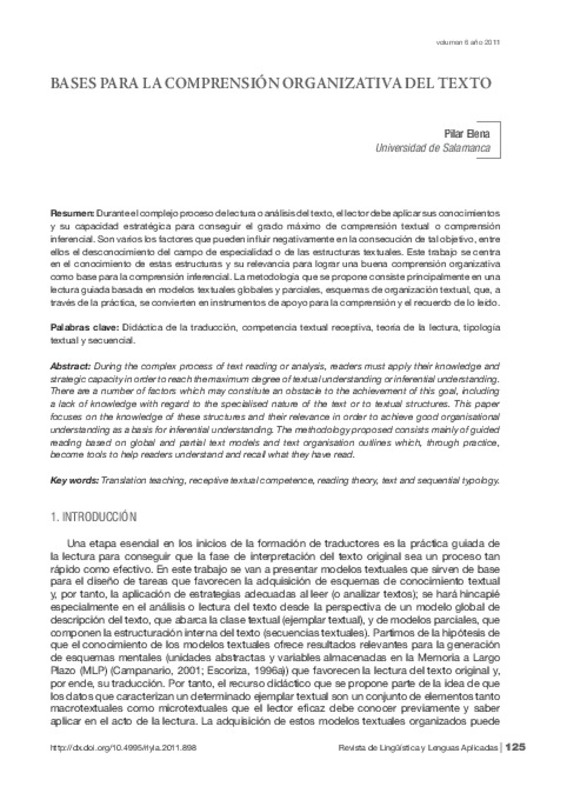JavaScript is disabled for your browser. Some features of this site may not work without it.
Buscar en RiuNet
Listar
Mi cuenta
Estadísticas
Ayuda RiuNet
Admin. UPV
BASES PARA LA COMPRENSIÓN ORGANIZATIVA DEL TEXTO
Mostrar el registro sencillo del ítem
Ficheros en el ítem
| dc.contributor.author | Elena, Pilar
|
es_ES |
| dc.date.accessioned | 2011-10-26T12:52:52Z | |
| dc.date.available | 2011-10-26T12:52:52Z | |
| dc.date.issued | 2011 | |
| dc.identifier.issn | 1886-2438 | |
| dc.identifier.uri | http://hdl.handle.net/10251/12398 | |
| dc.description.abstract | [EN] During the complex process of text reading or analysis, readers must apply their knowledge and strategic capacity in order to reach the maximum degree of textual understanding or inferential understanding. There are a number of factors which may constitute an obstacle to the achievement of this goal, including a lack of knowledge with regard to the specialised nature of the text or to textual structures. This paper focuses on the knowledge of these structures and their relevance in order to achieve good organisational understanding as a basis for inferential understanding. The methodology proposed consists mainly of guided reading based on global and partial text models and text organisation outlines which, through practice, become tools to help readers understand and recall what they have read. | es_ES |
| dc.description.abstract | [ES] Durante el complejo proceso de lectura o análisis del texto, el lector debe aplicar sus conocimientosy su capacidad estratégica para conseguir el grado máximo de comprensión textual o comprensióninferencial. Son varios los factores que pueden influir negativamente en la consecución de tal objetivo, entreellos el desconocimiento del campo de especialidad o de las estructuras textuales. Este trabajo se centraen el conocimiento de estas estructuras y su relevancia para lograr una buena comprensión organizativacomo base para la comprensión inferencial. La metodología que se propone consiste principalmente en unalectura guiada basada en modelos textuales globales y parciales, esquemas de organización textual, que, através de la práctica, se convierten en instrumentos de apoyo para la comprensión y el recuerdo de lo leído. | |
| dc.description.tableofcontents | 138 | |
| dc.language | Español | es_ES |
| dc.publisher | Editorial Universitat Politècnica de València | es_ES |
| dc.relation.ispartof | Revista de Lingüística y Lenguas Aplicadas | |
| dc.rights | Reserva de todos los derechos | es_ES |
| dc.subject | Didáctica de la traducción | es_ES |
| dc.subject | Competencia textual receptiva | es_ES |
| dc.subject | Teoría de la lectura | es_ES |
| dc.subject | Tipología textual y secuencial | es_ES |
| dc.subject | Translation teaching | es_ES |
| dc.subject | Receptive textual competence | es_ES |
| dc.subject | Reading theory | es_ES |
| dc.subject | Text and sequential typology | es_ES |
| dc.title | BASES PARA LA COMPRENSIÓN ORGANIZATIVA DEL TEXTO | es_ES |
| dc.type | Artículo | es_ES |
| dc.date.updated | 2011-10-26T11:18:48Z | |
| dc.identifier.doi | 10.4995/rlyla.2011.898 | |
| dc.rights.accessRights | Abierto | es_ES |
| dc.description.bibliographicCitation | Elena, P. (2011). BASES PARA LA COMPRENSIÓN ORGANIZATIVA DEL TEXTO. Revista de Lingüística y Lenguas Aplicadas. 6. https://doi.org/10.4995/rlyla.2011.898 | es_ES |
| dc.description.accrualMethod | SWORD | es_ES |
| dc.relation.publisherversion | https://doi.org/10.4995/rlyla.2011.898 | |
| dc.description.upvformatpinicio | 125 | |
| dc.description.volume | 6 | |
| dc.identifier.eissn | 1886-6298 | es_ES |








